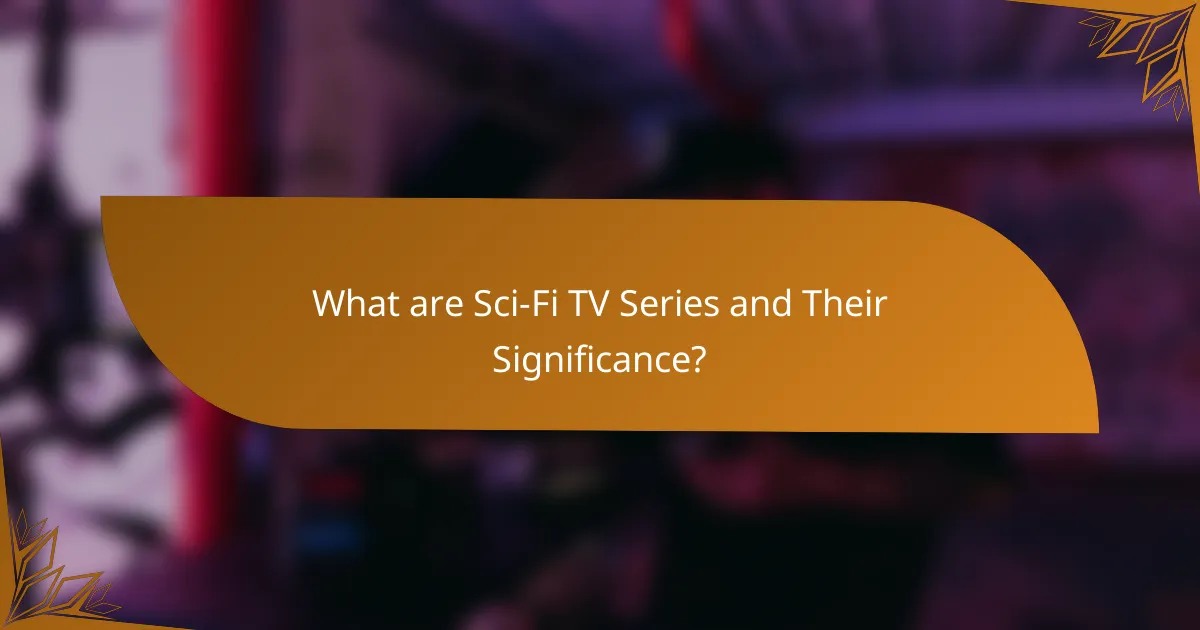Sci-Fi TV series are television programs that explore futuristic concepts, speculative technologies, and themes such as space exploration and time travel. These series often reflect societal issues and influence public perceptions of science and technology. Notable examples, including “Star Trek,” have introduced groundbreaking ideas like teleportation and artificial intelligence. The genre not only fosters critical thinking about humanity’s future but also has a substantial cultural impact, shaping popular culture and inspiring technological advancements. This article examines the key themes, iconic technologies, and cultural significance of Sci-Fi TV series.

What are Sci-Fi TV Series and Their Significance?
Sci-Fi TV series are television programs that explore futuristic concepts and speculative technologies. They often delve into themes such as space exploration, time travel, and advanced scientific phenomena. These series serve as a platform for examining societal issues through imaginative storytelling. They can influence public perception of science and technology. Notable examples include “Star Trek,” which introduced concepts like teleportation and artificial intelligence. Such series often inspire real-world technological advancements and innovations. The genre encourages critical thinking about the future and humanity’s role within it. Sci-Fi TV series have a significant cultural impact, shaping popular culture and inspiring generations of viewers.
How do Sci-Fi TV Series reflect futuristic themes?
Sci-Fi TV series reflect futuristic themes through their exploration of advanced technology, societal changes, and speculative concepts. These series often depict worlds shaped by innovations in artificial intelligence, space travel, and biotechnology. For example, shows like “Black Mirror” examine the consequences of technology on human behavior. Additionally, series such as “The Expanse” present complex political landscapes influenced by interplanetary colonization. Futuristic themes also include ethical dilemmas surrounding genetic engineering, as seen in “Altered Carbon.” By envisioning potential futures, these series provoke thought about the trajectory of humanity and technology. This reflection on futuristic themes often serves as a commentary on contemporary issues.
What are the common futuristic themes explored in Sci-Fi TV Series?
Common futuristic themes explored in Sci-Fi TV series include advanced technology, space exploration, and dystopian societies. These series often depict the impact of artificial intelligence on humanity. They also explore themes of time travel and alternate realities. Another common theme is the evolution of human and alien interactions. Many shows address environmental issues and their consequences. Themes of surveillance and loss of privacy are frequently examined. The exploration of identity and consciousness is also prevalent. These themes reflect societal concerns and aspirations related to the future.
How do these themes resonate with audiences today?
Futuristic themes in sci-fi TV series resonate with audiences today by reflecting current societal concerns and aspirations. These themes often explore technological advancements, ethical dilemmas, and the human condition. For instance, shows like “Black Mirror” highlight the impact of technology on daily life, prompting viewers to consider real-world implications. Additionally, iconic technologies portrayed in these series inspire innovation and spark discussions about future possibilities. According to a 2021 survey by the Pew Research Center, 60% of viewers believe sci-fi influences their views on technology and society. This connection between fiction and reality enhances the genre’s relevance and appeal to contemporary audiences.
What iconic technologies are portrayed in Sci-Fi TV Series?
Iconic technologies portrayed in Sci-Fi TV Series include advanced robotics, artificial intelligence, and teleportation devices. Examples of advanced robotics can be seen in shows like “Battlestar Galactica” with the Cylons. Artificial intelligence is prominently featured in “Westworld,” where AI hosts exhibit human-like consciousness. Teleportation devices are famously represented in “Star Trek,” specifically the transporters that move characters instantaneously. Other notable technologies include virtual reality in “Black Mirror” and time travel in “Doctor Who.” Each of these technologies reflects societal hopes and fears regarding the future.
Which technologies have become staples in the Sci-Fi genre?
Artificial intelligence, space travel, and advanced robotics are staples in the Sci-Fi genre. These technologies are prominently featured in many iconic Sci-Fi works. For instance, artificial intelligence often plays a central role in narratives, as seen in films like “Blade Runner.” Space travel is a common theme, exemplified by franchises such as “Star Trek” and “Star Wars.” Advanced robotics, including humanoid robots, appear frequently in stories like “Westworld.” These technologies shape the genre’s exploration of future societies and ethical dilemmas. Their consistent presence highlights the genre’s focus on human interaction with technology.
How do these technologies influence real-world advancements?
Technologies depicted in sci-fi TV series significantly influence real-world advancements. They inspire innovation by showcasing futuristic concepts that spark imagination and creativity. For example, the communicators in “Star Trek” paved the way for modern mobile phones. The depiction of artificial intelligence in shows like “Westworld” has accelerated research in machine learning. Additionally, advancements in robotics have been influenced by representations in series such as “Battlestar Galactica.” These technologies serve as blueprints for engineers and scientists. They encourage investment in research and development in various fields. The cultural impact of these series shapes public perception and acceptance of emerging technologies. Overall, sci-fi technologies act as catalysts for real-world technological progress.
What is the cultural impact of Sci-Fi TV Series?
Sci-Fi TV series significantly influence culture by shaping societal perceptions of technology and the future. They often explore themes of identity, ethics, and humanity’s relationship with technology. For example, “Star Trek” introduced concepts like the universal translator, inspiring real-world advancements in communication technology. Shows like “Black Mirror” provoke discussions on the implications of technological advancements on society. Sci-Fi series also reflect and critique contemporary social issues, such as race, gender, and environmental concerns. Their narratives can drive public interest in scientific fields, leading to increased education and career pursuits in STEM. Cultural references from these series permeate everyday language and popular culture, illustrating their lasting impact.
How have Sci-Fi TV Series shaped societal views and discussions?
Sci-Fi TV series have significantly influenced societal views and discussions. They often explore complex themes such as technology, ethics, and identity. These narratives provoke critical thinking about the future and humanity’s direction. For example, series like “Black Mirror” highlight the potential consequences of technological advancements. This encourages viewers to reflect on their relationship with technology. Additionally, shows like “Star Trek” promote diversity and inclusion, shaping public perceptions of social issues. Studies indicate that Sci-Fi can inspire real-world innovation and policy discussions. Thus, these series serve as a mirror to society, prompting dialogue and fostering awareness of pressing issues.
What role do they play in influencing popular culture?
Sci-Fi TV series play a significant role in influencing popular culture. They introduce futuristic themes and technologies that shape societal perceptions. For example, series like “Star Trek” popularized concepts like smartphones and video conferencing. These shows often reflect societal hopes and fears, impacting public discourse. They inspire innovations in technology and design, leading to real-world advancements. Additionally, they create shared cultural references that resonate across generations. Sci-Fi series often challenge social norms, encouraging discussions on ethics and humanity. Their influence extends into fashion, language, and lifestyle choices, showcasing their pervasive impact on culture.
How do Sci-Fi TV Series connect with viewers emotionally?
Sci-Fi TV series connect with viewers emotionally through relatable characters and complex narratives. These series often explore universal themes such as love, loss, and identity within fantastical settings. Viewers find emotional resonance in characters facing moral dilemmas or existential crises. The imaginative worlds provide a backdrop for reflecting on real-life issues. Sci-Fi also invites audiences to contemplate the future and humanity’s place within it. This connection is reinforced by high-stakes scenarios that evoke empathy and concern for the characters’ fates. Research shows that viewers often project their own experiences onto the characters, deepening emotional engagement. This blend of relatable themes and imaginative storytelling creates a strong emotional bond with the audience.
What are the trends in Sci-Fi TV Series today?
Current trends in Sci-Fi TV series include a focus on diverse storytelling and complex characters. Many shows now explore themes of identity, morality, and societal issues. Streaming platforms have increased the production of original content, allowing for niche stories to flourish. High-quality visual effects and production values are now standard, enhancing viewer immersion.
Additionally, there is a growing trend towards serialized storytelling, with interconnected plots spanning multiple seasons. The incorporation of real scientific concepts, such as artificial intelligence and climate change, adds relevance. Audiences are increasingly drawn to shows that challenge traditional genre boundaries.
Data from recent surveys indicate that Sci-Fi viewership has risen significantly, reflecting its popularity in contemporary culture. These trends highlight the evolving landscape of Sci-Fi television, adapting to audience preferences and technological advancements.
What are the best practices for engaging with Sci-Fi TV Series?
To effectively engage with Sci-Fi TV Series, viewers should actively participate in discussions and analysis. Joining online forums or social media groups dedicated to these series enhances understanding. Watching with a critical eye promotes deeper appreciation of themes and narratives. Taking notes on character development and plot twists aids in retention. Exploring related literature or source material enriches the viewing experience. Attending fan conventions or events can foster community connections. Engaging with creators through interviews or Q&A sessions provides unique insights. Lastly, revisiting episodes allows for discovering nuanced details missed during initial viewing.
How can viewers enhance their experience of Sci-Fi TV Series?
Viewers can enhance their experience of Sci-Fi TV Series by engaging with supplementary content. This includes reading books or comics related to the series. Exploring fan theories can deepen understanding of plot intricacies. Participating in online forums allows for discussion with other fans. Watching behind-the-scenes features provides insight into production choices. Attending conventions can connect viewers with creators and actors. Utilizing streaming services’ interactive features can enrich the viewing experience. Engaging with social media discussions can keep viewers updated on news and trends.
What communities exist for fans of Sci-Fi TV Series?
Online communities for fans of Sci-Fi TV series include forums, social media groups, and fan clubs. Popular platforms like Reddit host subreddits dedicated to specific series. Facebook has numerous groups where fans discuss episodes and theories. Discord servers provide real-time chat options for fan interactions. Websites like IMDb and TV Tropes feature discussion boards for various shows. Meetup.com facilitates local gatherings for fans. Additionally, conventions like Comic-Con bring fans together to celebrate their favorite series. These communities foster engagement and sharing of content related to Sci-Fi TV series.
Sci-Fi TV series are television programs that explore futuristic themes, advanced technologies, and societal issues through imaginative storytelling. This article examines the significance of these series, highlighting common themes such as space exploration, artificial intelligence, and dystopian societies. It also discusses the cultural impact of sci-fi series on public perception, technological advancements, and contemporary societal discussions. Additionally, the article outlines trends in the genre and offers best practices for engaging with sci-fi content, including community involvement and supplementary resources.

